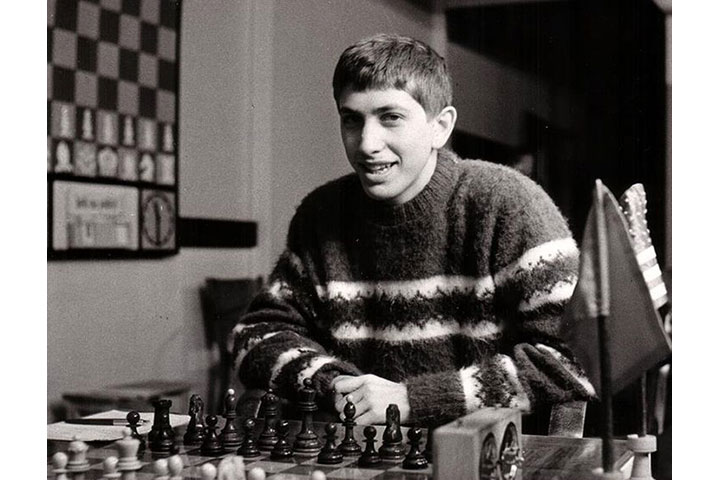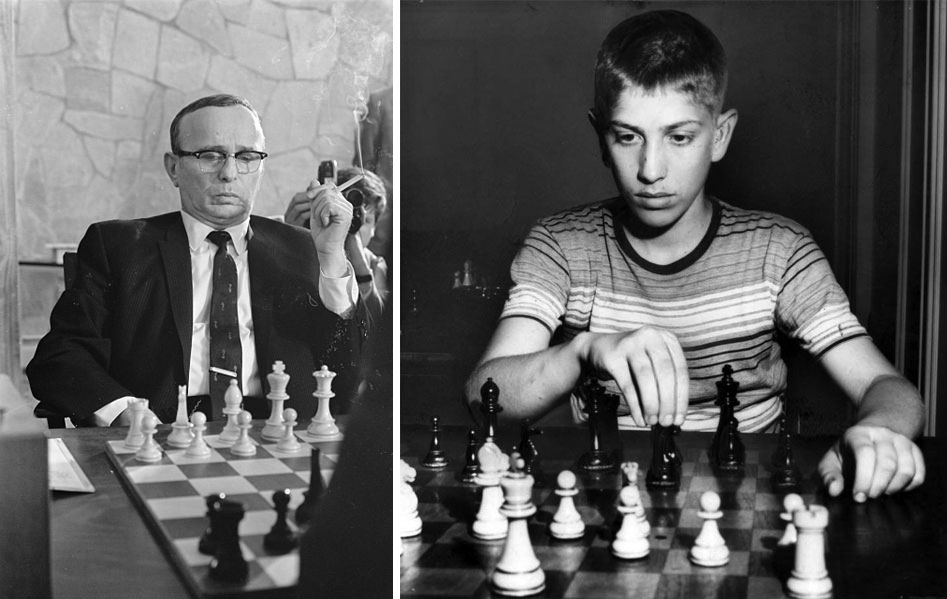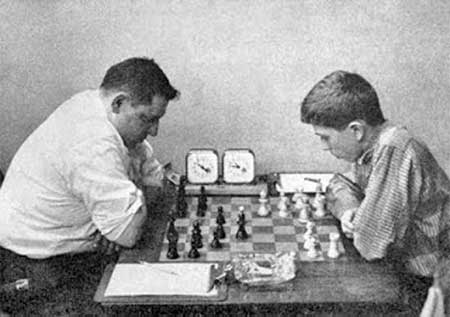


Master Class Vol.1: Bobby Fischer
No other World Champion was more infamous both inside and outside the chess world than Bobby Fischer. On this DVD, a team of experts shows you the winning techniques and strategies employed by the 11th World Champion.
Grandmaster Dorian Rogozenco delves into Fischer’s openings, and retraces the development of his repertoire. What variations did Fischer play, and what sources did he use to arm himself against the best Soviet players? Mihail Marin explains Fischer’s particular style and his special strategic talent in annotated games against Spassky, Taimanov and other greats. Karsten Müller is not just a leading international endgame expert, but also a true Fischer connoisseur.
Robert James Fischer won every U.S. Championship in which he took part during his career — eight times all in all — and today is considered as one of the best players of all time. 60 years later, his result in 1958 might not seem as spectacular as it was back then. Today many 14-year old talents have grandmaster strength (or are already grandmasters). But consider that in 1958 this was virtually unheard of.
Back then Fischer's win was a sensation. Obviously he was highly talented, but Fischer still seemed to lack experience. Before the U.S. Championship 1957/1958 he had played only 110 official tournament games, and only one really strong tournament, the Lessing Rosenwald Memorial 1956. In this tournament he had played the "Game of the Century" against Donald Byrne but still had to learn the hard way and with 4½ / 11 he finally shared only eighth to tenth place. Okay, in 1957 Fischer had won both the U.S. Junior Championship and the U.S. Open Championship but both tournaments were not nearly as strong as the U.S. Championship 1957/1958.
The Championship attracted a number of strong players because the first two places automatically qualified for the Interzonal Tournament — part of the World Championship cycle — and thanks to a group of wealthy sponsors who wanted to support chess in the USA the prizes were also attractive. Pre-tournament favourite was Samuel Reshevsky, who at that time was considered to be the strongest player in the US.

(Left) Samuel Reshevsky at the Candidates 1968 | Photo: By Kroon, Ron / Anefo CC BY-SA 3.0 nl, via Wikimedia Commons | (Right) Bobby Fischer in 1957 | Photo: Robert Walker, New York Times
Reshevsky, who was born on November 26, 1911, no longer was a wunderkind but still one of the strongest players in the world. At the World Championship Tournament 1948 in Moscow and The Hague, he shared third to fourth place with Paul Keres, behind tournament winner Mikhail Botvinnik and Vasily Smyslov, and at the Candidates Tournament in Zurich 1953 Reshevsky had shared second to fourth place with David Bronstein and Keres, behind Smyslov, who won the tournament.
Apart from Reshevsky, young talents such as reigning World Junior Champion William Lombardy or Larry Evans were given chances to win the title. Defending champion was Arthur Bisguier and before the tournament he predicted that Fischer would score a bit more than 50 percent. (see Andy Soltis, The United States Chess Championship, 1845-2011, McFarland 2012, p. 90.)
But right from the start the 14-year old Fischer showed that he wanted to win the title. His chess was surprisingly mature and universal. He was well versed in current opening theory, and impressed onlookers with attacking and positional skills as well as his ability to defend difficult positions.
After the penultimate round Fischer led with 10.0 /12, half a point ahead of Reshevsky who had 9½/12. In the final round Fischer played an 18-move short and unspectacular draw against Abe Turner, hoping that his friend and training partner William Lombardy, who had to play with Black against Reshevsky in the final round, would not lose.

Bobby Fischer (right, with White) against Abe Turner | Photo: Chess Review 1958)
Lombardy indeed — as he would later do so often — turned out to be of great help and support to Fischer. He won against Reshevsky by playing one of the best games of his life and helped Fischer to win the tournament and his first U.S. title.
King's Indian: A modern approach
Bologan: "If you study this DVD carefully and solve the interactive exercises you will also enrich your chess vocabulary, your King's Indian vocabulary, build up confidence in the King's Indian and your chess and win more games."
| Rk. | Name | 1 | 2 | 3 | 4 | 5 | 6 | 7 | 8 | 9 | 10 | 11 | 12 | 13 | 14 | Pts. |
| 1 | Robert James Fischer | ½ | 1 | 1 | ½ | 1 | ½ | 1 | ½ | 1 | 1 | 1 | ½ | 1 | 10.5 | |
| 2 | Samuel Herman Reshevsky | ½ | 0 | 0 | 1 | ½ | 1 | 1 | 1 | 1 | ½ | 1 | 1 | 1 | 9.5 | |
| 3 | James T Sherwin | 0 | 1 | ½ | ½ | ½ | 1 | 0 | ½ | 1 | 1 | 1 | 1 | 1 | 9.0 | |
| 4 | William James Lombardy | 0 | 1 | ½ | ½ | ½ | ½ | ½ | 0 | 0 | 1 | 1 | 1 | 1 | 7.5 | |
| 5 | Hans Jack Berliner | ½ | 0 | ½ | ½ | ½ | 0 | 0 | ½ | 1 | 1 | 1 | ½ | 1 | 7.0 | |
| 6 | Edmar John Mednis | 0 | ½ | ½ | ½ | ½ | 0 | ½ | 0 | ½ | 1 | ½ | 1 | 1 | 6.5 | |
| 7 | Arnold Sheldon Denker | ½ | 0 | 0 | ½ | 1 | 1 | 0 | ½ | 1 | 0 | 0 | 1 | 1 | 6.5 | |
| 8 | Arthur William Feuerstein | 0 | 0 | 1 | ½ | 1 | ½ | 1 | 1 | 0 | 0 | ½ | ½ | ½ | 6.5 | |
| 9 | Herbert Seidman | ½ | 0 | ½ | 1 | ½ | 1 | ½ | 0 | 1 | 0 | 0 | 1 | 0 | 6.0 | |
| 10 | Arthur Bernard Bisguier | 0 | 0 | 0 | 1 | 0 | ½ | 0 | 1 | 0 | 1 | ½ | 0 | 1 | 5.0 | |
| 11 | Sidney Norman Bernstein | 0 | ½ | 0 | 0 | 0 | 0 | 1 | 1 | 1 | 0 | 1 | ½ | 0 | 5.0 | |
| 12 | Attilio Di Camillo | 0 | 0 | 0 | 0 | 0 | ½ | 1 | ½ | 1 | ½ | 0 | 0 | 1 | 4.5 | |
| 13 | Abe Turner | ½ | 0 | 0 | 0 | ½ | 0 | 0 | ½ | 0 | 1 | ½ | 1 | ½ | 4.5 | |
| 14 | George Mortimer Kramer | 0 | 0 | 0 | 0 | 0 | 0 | 0 | ½ | 1 | 0 | 1 | 0 | ½ | 3.0 |